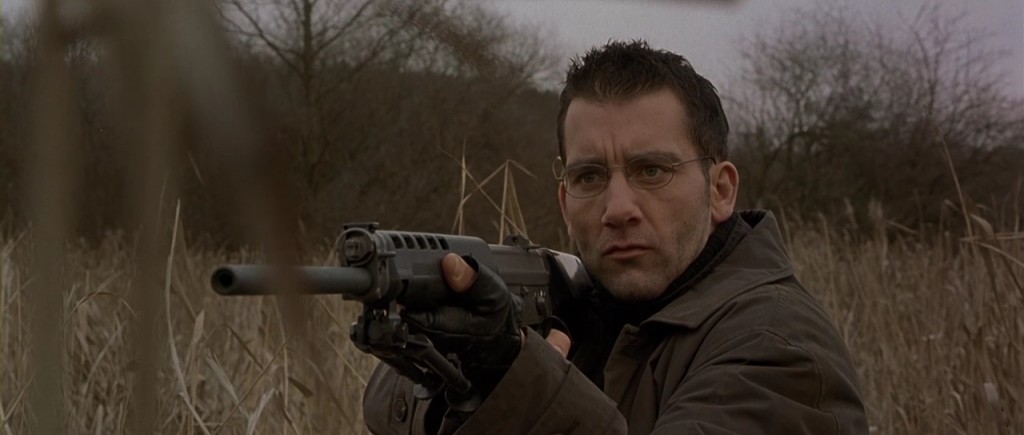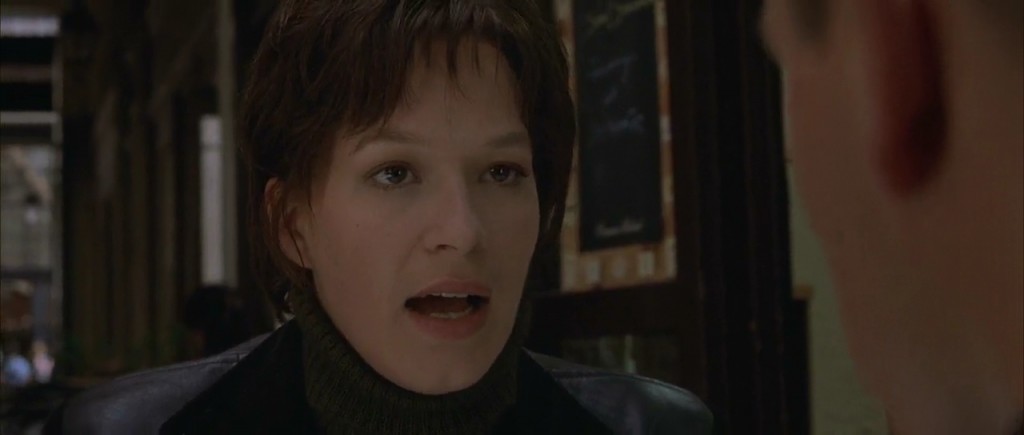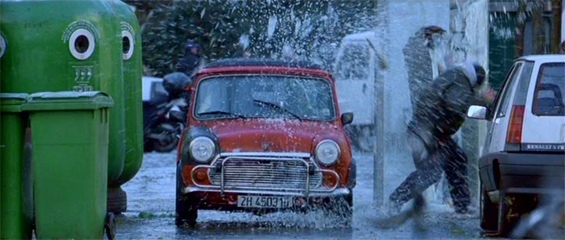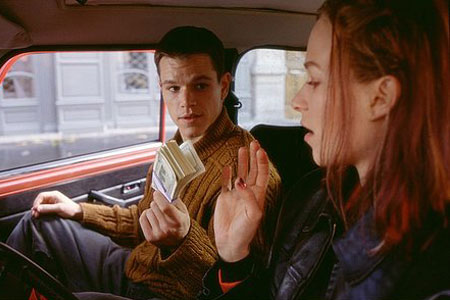Favorite screenplays: The Bourne Identity part 7
Act III begins as Act II did — with an explosion of activity from Conklin back at CIA headquarters. Here, he barks orders at all his kids about how to pinpoint Bourne, crosscut with him reassuring his father-figure Abbott that Bourne will be caught and killed. Abbott, we learn, is upset about Bourne solely because of a budget meeting he has coming up with his Congressional overseers and Treadstone looks to be a big fat failure. So we see that, as is often the case in familial disputes, it all comes down to money.
Favorite screenplays: The Bourne Identity part 6
Jason and Marie have gone, in two days, from strangers to lovers. Marie, once spooked and then terrified by Jason, is now totally into the whole Bourne lifestyle — although she doesn’t really know what that means yet.
Favorite screenplays: The Bourne Identity part 5
So now Jason Bourne has a dependent. Marie, who was already pretty messed up to begin with, has just seen Jason beat up an assassin and the assassin throw himself out a window. Jason wants to give Marie an out, but she’s in shock. Seeing the kindly old landlady shot in the head in the foyer doesn’t help. The point is, Marie is having her own identity crisis: is she, she must decide, the kind of woman who puts her life in the hands of a man like Jason Bourne?
Favorite screenplays: The Bourne Identity part 4
Bang! Act II of The Bourne Identity begins with a dizzying montage of activity. In CIA headquarters, Conklin’s sons bring up “the grid,” the international web of electronic checkpoints that can pinpoint just about anybody at any given time. (When people talk about being “off the grid,” that’s what they’re talking about — they cannot be traced through electronic channels.) Conklin wants Bourne dead: quite a bad father indeed. It’s one thing to be cold and distant, it’s something else again to want to kill your son. Worse, he’s decided to “wake up” all of Bourne’s fellow Treadstone assassins — in essence, his “blood brothers.” Conklin wants to set brother against brother. There are families where no one ever talks about anything, but Conklin is running a family where the brothers don’t even know each other’s names.
Favorite screenplays: The Bourne Identity part 3
So Jason Bourne has gone to a bank to find himself. It turns out, a bank is not a good place to find oneself. But he does have a name now, a whole handful of names actually, and he heads out into his mysterious new life. His first instinct is to phone himself. It must be an odd thing, to phone oneself. Logic dictates that no one can possibly answer when you phone yourself, but Jason does. Why? Does he hope he will pick up? Does he hope someone else will pick up? Or is he just looking for confirmation, that there is, in fact, someone named Jason Bourne who actually has a telephone number, one of the many societal indicators that he does, indeed, have an identity?
He doesn’t get very far before he’s pursued by police. Why are the police after him? We, like he, don’t know, although we, like he, figure that a box full of money, a stack of passports and a gun don’t add up to a strictly legal identity.
Favorite screenplays: The Bourne Identity part 2
Jason Bourne has left the fishing boat, which is his metaphorical home town, has said goodbye to his foster father, and has set out to seek his fortune in the world. That sounds like the opening of a Grimm tale, which might seem odd for a fast-paced, big-budget espionage thriller. And yet, it just goes to show that storytelling hasn’t really changed since Grimm — there are still orphans, literal and figurative, leaving home, looking for themselves, looking for their identities. (Hanna took this to much more explicit ends.)
(Further reflection on my part connects Jason Bourne to Melville’s Ishmael — another orphan of the storm fished out of the water — but that’s a discussion for another time.)
Favorite screenplays: The Bourne Identity part 1
WHAT DOES THE PROTAGONIST WANT?
Jason Bourne wants something truly fundamental: he wants to know who he is. “Who am I?” is one of the building blocks of narrative, and well-drawn characters are always asking themselves the question in one form or another. Luke Skywalker wants to know if he’s a simple farm boy or the savior of the rebellion, Chief Brody wants to know if he has what it takes to kill the shark, Clarice Starling wants to know if she can triumph in a world run by men, Danny Ocean wants to know if he is still lovable. A screenwriter is always looking for “a way in” to the material, something that is universal and strongly felt. No one has ever woken with amnesia and found out he’s a trained assassin, no one has ever had to blow up their father’s space station, no one has ever hunted a deranged killer while avoiding the advances of a second deranged killer. But the viewer identifies intensely with every protagonist here because the writer has found “a way in” to the story.
Inglourious Basterds part 5
At the top of Act V of Inglourious Basterds, Shoshanna broods in her red dress and puts on her war paint — her makeup — in order to do battle with the Nazis and (as far as she knows) single-handedly win WWII. As she broods, we are treated to a quick flashback to her and Marcel, her boyfriend/projectionist, making a short movie in the projection-booth stairwell and taking it to the chemist to get it developed. Unfortunately, the movie is set in Nazi-occupied France, which means that Shoshanna and Marcel have to pin the chemist to a table and threaten him and his family with an axe just to get a roll of film developed — CVS’s one-hour photo services are, apparently, far in the distant future.
Inglourious Basterds part 4
Okay. So, we’ve got this movie, Inglourious Basterds. Twenty minutes into it, it starts over. Twenty minutes after that, it starts over again. Now, incredibly, at one hour and four minutes, it starts over for the fourth time, with a whole new protagonist, who won’t live through the act, and introduces yet another major character. I can’t think of another movie that’s ever done this. Even 2001 eventually settles on a main character and follows his story to conclusion. High and Low switches protagonists for an hour before coming back to its original protagonist, but Basterds has, so far, boasted three completely separate protagonists and is now introducing a fourth. And it fully expects us to be invested in this brand new character.
Inglourious Basterds part 3
Thirty-eight minutes into Inglourious Basterds, something very strange happens — the movie starts over, for the third time.







